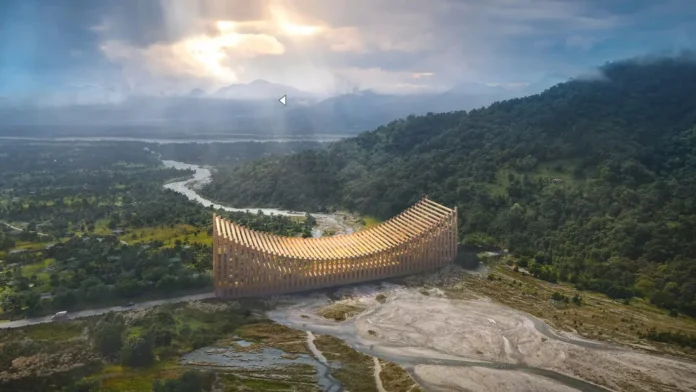The Kingdom of Bhutan, renowned for its innovative approach to development through the concept of Gross National Happiness (GNH) and for being the first carbon-negative country in the world, is embarking on an ambitious mega project. The creation of a ‘Mindfulness City’ in Gelephu aims to foster sustainable development while enhancing cross-border cooperation with India.
A Vision for Sustainable Development
Strategically located along the Indian border in Assam, the Gelephu ‘Mindfulness City’ is set to transform not just Bhutan but also the region, acting as an interconnected hub for South and Southeast Asia. Envisioned by King Jigme Khesar Namgyel Wangchuck, this mega project is a part of Bhutan’s strategy to capitalize on its geographical advantages, promoting economic growth and collaboration.
Spanning an impressive 2,500 square kilometers, Gelephu will function as a Special Administrative Region (SAR) with its own governance structure, enabling it to enact laws and maintain an independent judiciary. This degree of autonomy is expected to catalyze the region’s development, providing tailored solutions to local challenges.
Economic Hub and Cross-Border Opportunities
The ambitious Mindfulness City is poised to become Bhutan’s economic center, linking South Asia and Southeast Asia through enhanced trade and cooperation. The project is seen as a game changer, providing various benefits to India as well, including increased trade opportunities and strengthened bilateral relations.
King Wangchuck emphasized that this city would serve as Bhutan’s economic hub, allowing the nation to effectively harness the economic corridor that links these two regions. The project promises to enhance not only Bhutan’s economic landscape but also the livelihoods of its residents.
Natural Resources and Environmental Harmony
The Gelephu ‘Mindfulness City’ will boast two protected areas: a national park and a wildlife sanctuary, highlighting Bhutan’s commitment to preserving its natural heritage. The area is blessed with abundant rivers, which have the potential to generate between 4,000 to 5,000 megawatts of renewable energy, promoting sustainability.
According to Prime Minister Tshering Tobgay, the residents of Gelephu will enjoy a harmonious lifestyle that coexists with nature and regional biodiversity. He termed this sustainable approach as ‘Gross National Happiness 2.0’, emphasizing the importance of well-being and environmental stewardship.
Infrastructure and Urban Design
Once completed, the Mindfulness City will encompass nearly 2.5% of Bhutan’s total land area, surpassing the size of Singapore, while offering a low-rise urban design that respects the landscape. The planned infrastructure includes:
- Inhabitable bridges connecting different areas of the city
- A university aimed at fostering education and innovation
- Healthcare facilities that provide both Western and traditional medicine
- Various markets and spiritual centers to cater to the community’s cultural needs
Additionally, the city will feature a hydroelectric power project and a hydroponic greenhouse to ensure food security and sustainability. An international airport is already under construction, set to enhance connectivity and accessibility for both residents and visitors.
Strategic Importance of Gelephu
The choice of Gelephu as the site for this mega project is strategic, taking advantage of its proximity to India. Prime Minister Tobgay highlighted that selecting this location would not only facilitate successful project execution but would also reinforce Bhutan’s strong ties with India, crucial for the nation’s future.
By leveraging its geographical position, Gelephu is expected to become a focal point for cross-border trade and cultural exchange, creating opportunities for both Bhutan and its neighboring countries.
The Gelephu ‘Mindfulness City’ project signifies Bhutan’s commitment to sustainable development while enhancing regional cooperation. As the country continues to pave the way towards a prosperous future, this innovative city stands to be a testament to Bhutan’s unique approach to development, rooted in happiness and harmony with nature.
This initiative not only promises to transform Gelephu but also aims to solidify Bhutan’s role as a key player in South and Southeast Asia, fostering deeper connections with India and beyond. As construction progresses, the world will be watching how this ambitious project unfolds and its potential impact on the region.


